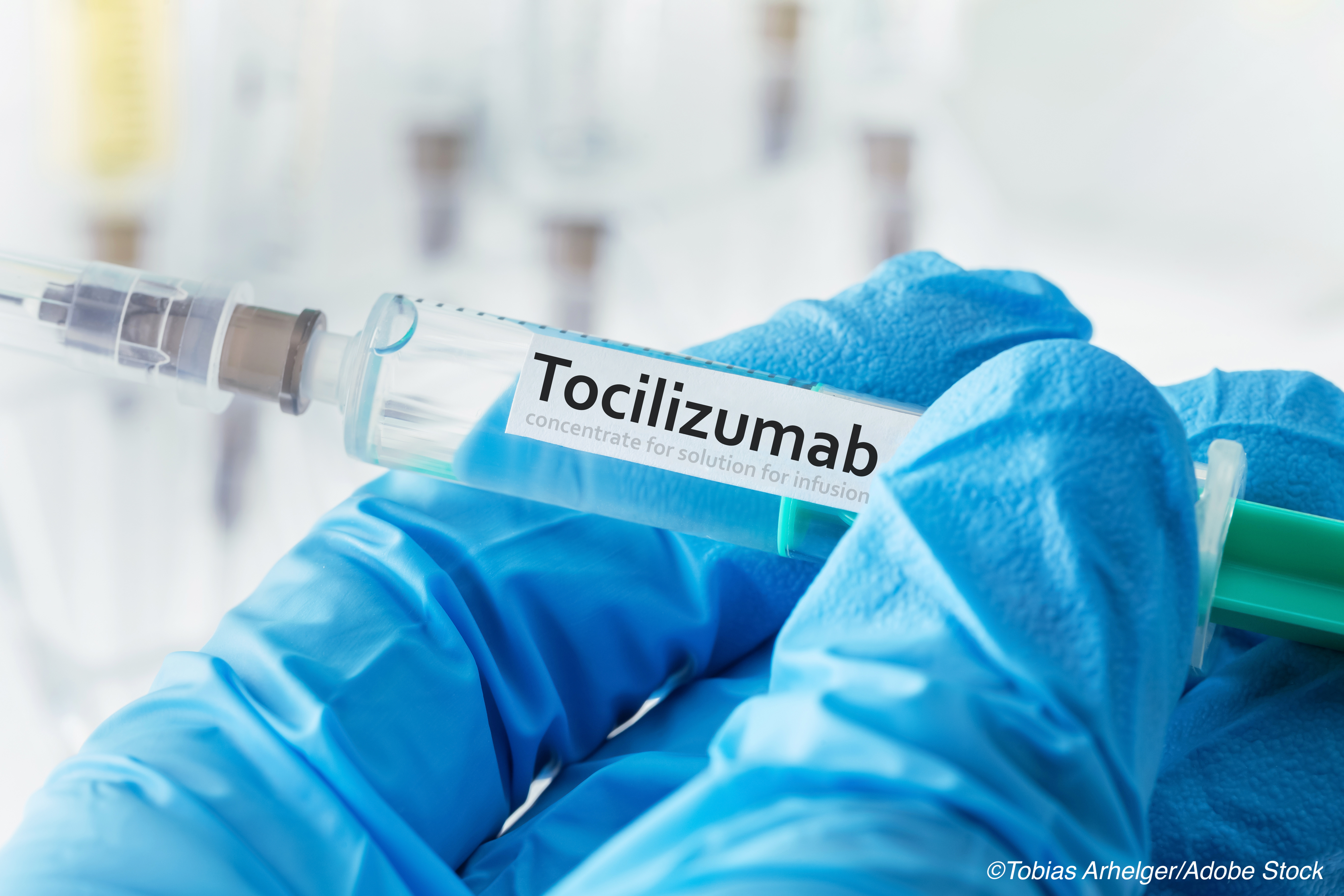
Among patients hospitalized with Covid-19 pneumonia not on mechanical ventilation, treatment with the biologic tocilizumab was associated with reduced risk of progression to mechanical ventilation or death, according to findings from the phase III EMPACTA clinical trial.
Treatment with the anti-interleukin-6-receptor monoclonal antibody did not appear to reduce short-term, all-cause mortality among the study cohort, however, when added to standard care.
But tocilizumab treatment was associated with a clear advantage compared to standard care alone with regard to the composite study endpoint of progression to mechanical ventilation or death (12% versus 19.3%; hazard ratio, 0.56; 95% CI, 0.33-0.97; P=0.04).
Results from the EMPACTA trial, funded by Genentech, were published online Dec. 17 in the New England Journal of Medicine.
The trial enrolled a high percentage of patients who were members of minority groups disproportionately affected by Covid-19 and largely underrepresented in clinical trials. More than 4 out of 5 (84%) of study participants were members of racial or ethnic minorities.
A quarter of the study participants were older than 65 years of age, and three-quarters had at least one coexisting condition.
Researcher Carlos Salama, MD, of Mount Sinai Hospital, New York City, and colleagues noted that while the analysis was exploratory, the primary efficacy outcomes assessed according to race or ethnic group were consistent with the outcomes in the overall patient population.
Higher levels of IL-6 have been positively correlated with cases of critical and severe Covid-19, while lower levels of interleukin-6 have been linked to milder disease. Elevated IL-6 levels have also been found to be predictive of progression to mechanical ventilation.
The researchers noted that treatment with tocilizumab — approved for the treatment of rheumatoid and juvenile arthritis — has been linked to improved outcomes in several observational studies, while randomized trials have been mixed in patients with varying Covid-19 severity receiving varying standards of care.
The Evaluating Minority Patients with Actemra (EMPACTA) trial included 389 patients hospitalized for Covid-19 and pneumonia from 6 countries randomized to receive standard of care plus one or two doses of intravenous tocilizumab (8 mg per kilogram of body weight) or placebo.
The modified intention to treat population included 249 patients treated with tocilizumab and 128 in the placebo group.
More than half (56%) were Hispanic or Latino, while close to 15% were Black, 12.7% were American Indian or Alaska Native, 12.7% were non-Hispanic white, and 3.7% were of another or unknown racial or ethnic group.
Tocilizumab treatment met the study’s primary endpoint of reduced progression to mechanical ventilation or death at 28 days, but when death from any cause alone was evaluated as a secondary outcome, treatment with the drug did not reach statistical significance.
In all, 10.4% of patients in the tocilizumab group and 8.6% in the placebo group died from any cause within 28 days of enrollment (weighted difference, 2.0 percentage points; 95% CI, −5.2 to 7.8).
“One hypothesis is that patients who had progression to mechanical ventilation after receiving tocilizumab may compose a subgroup of patients with more severe disease and therefore a higher risk for death; this hypothesis is supported by the fact that a larger percentage of patients in the placebo group than in the tocilizumab group died without receiving mechanical ventilation,” the researchers wrote.
Two recently reported Covid-19 tocilizumab trials — COVACTA and the Boston Area Covid-19 Consortium [BACC] – both showed little benefit for tocilizumab treatment, raising doubts about the efficacy of IL-6 blockade in the treatment of patients with severe Covid-19 pneumonia.
Salama and colleagues noted that the EMPACTA patient cohort as a group had less severe disease than that reported in COVACTA and BACC. In addition, standard therapy in EMPACTA more often included concomitant glucocorticoid or antiviral agents, which “have become the mainstay of standard care for patients with Covid-19.”
“The results of our trial suggest that patients who are most likely to benefit from tocilizumab have moderate or severe disease (i.e., they have hypoxia but are not yet receiving mechanical ventilation) and that tocilizumab may add to the potential benefit of antiviral treatment and glucocorticoids,” they wrote.
“In this trial, 55.4% of the patients in the tocilizumab group and 67.2% of those in the placebo group received concomitant dexamethasone, and a greater benefit was observed with tocilizumab than with placebo with respect to the primary outcome. Ongoing trials are underway to provide clarity on the patient subgroups that are most likely to benefit from specific immunomodulatory therapies.”
- Among patients hospitalized with Covid-19 pneumonia not on mechanical ventilation, treatment with the arthritis drug tocilizumab was associated with reduced risk of progression to mechanical ventilation or death, phase III data from the EMPACTA clinical trial.
- The EMPACTA trial enrolled a high percentage of patients who were members of minority groups disproportionately affected by Covid-19 and largely underrepresented in clinical trials.
Salynn Boyles, Contributing Writer, BreakingMED™
This research was funded by Genentech.
Lead author Carlos Salama reported receiving personal fees from Genentech unrelated to the study. Corresponding author Shalini Mohan reported receiving personal fees and other fees from Genentech, Inc, outside the submitted work and holding patent 63/079,877 from the EMPACTA trial pending.
Cat ID: 125
Topic ID: 79,125,254,930,585,791,932,730,933,125,190,926,192,927,151,928,925,934


